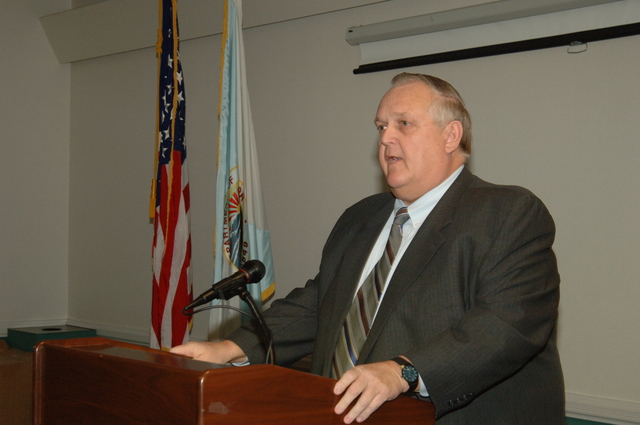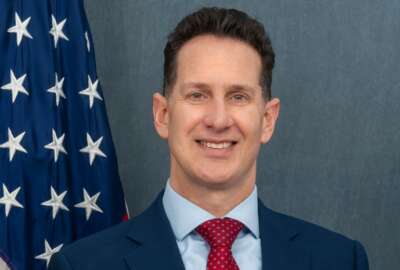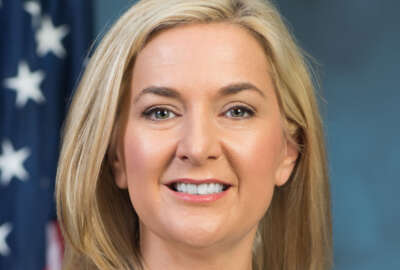Inspectors general reflect on career, impact of the late Earl Devaney
The community of inspectors general lost one of its leading lights recently with the death of former Interior Department IG Earl Devaney.
Best listening experience is on Chrome, Firefox or Safari. Subscribe to Federal Drive’s daily audio interviews on Apple Podcasts or PodcastOne.
The community of inspectors general lost one of its leading lights recently with the death of former Interior Department IG Earl Devaney. Devaney also headed up the Recovery, Accountability and Transparency Board in 2009. For more on the meaning of Devaney’s career, the National Science Foundation Inspector General Allison Lerner, and the Interior Department IG Mark Lee Greenblatt, joined the Federal Drive with Tom Temin.
Interview transcript:
Tom Temin: Ms. Lerner, good to have you back.
Allison Lerner: Thank you. Pleasure to be here, Tom.
Tom Temin: And the Interior Department’s current IG, Mark Lee Greenblatt. Mr. Greenblatt, good to have you back.
Mark Lee Greenblatt: Thank you. It’s good to be here.
Tom Temin: Of course, I knew Earl Devaney and had been on panels with him and had him on the show during the RAT Board era. What’s your main impression of him because I think he was inspiring to a lot of current inspectors general, Allison?
Allison Lerner: they coined the phrase larger than life for Earl. And he was not just physically though his presence, his charisma, his passion for oversight, saved our community in so many different ways that we still feel so his loss last week really resonated with all of us.
Tom Temin: And Mark, the Interior Department itself is somewhat differently constituted at least some parts of it, thanks to his direct work there.
Mark Lee Greenblatt: Absolutely. He was, as Allison said, larger than life, he was a true trailblazer in the oversight community, and it had a material impact here at the Department of the Interior. In fact, one of his most prominent investigations led to the disbanding of the Minerals Management Service, which found significant problems with their royalties in kind program to the tune of $10 billion in a wide array of just very bad misconduct, frankly, and led to the breakup of that bureau, which is a pretty significant thing in the federal government. That doesn’t happen very often. So yes, to your point, that was just one piece of significant impact that Earl had.
Tom Temin: And I think IGs, in some ways are analogous to chief financial officers. That is to say, they are statutorily enabled and created, but it was many years before CFOs and IGs really kind of gained the stature and level of authority that Congress envisioned and that the federal government needed. Would it be fair to say that Earl Devaney was one of the people that helped push that ball along?
Allison Lerner: Absolutely. And, you know, one thing that distinguishes IGs from CFOs is our independence. Nobody embodied an independent focused overseer better than Mr. Devaney did, as I said before, the passion that he had was an incredible gift to our community. And we’re still benefiting from it.
Mark Lee Greenblatt: There’s no question that he raised the profile of the inspectors general community, which is just critical for us to have real impact. And I think it’s safe to say, you know, Teddy Roosevelt said, speak softly and carry a big stick, Earl spoke loudly and carried a big stick. He did both. He had a colorful personality. He had a way with words, he was a fantastic storyteller. And that connected what we do, which can be theoretical and very nuanced. But he was he had a gift for converting that into what our stakeholders, be they in Congress or in the public, what they can understand and what they can act on.
Tom Temin: And fierce as he was as an overseer in personal dealings, he was very disarming. True, wasn’t he?
Allison Lerner: Absolutely, I think and he cared for and stood behind his staff in a way that I think everyone who works for an IG would want to have happen. So he was wonderful to work for. And his office prospered under his leadership, because of the security that people had that if they went out and did their best work, whatever came as pushback came as a result of that Mr. Devaney would be there and have their back.
Tom Temin: We’re speaking with Allison Lerner. She’s the inspector general at the National Science Foundation. And with Mark Lee Greenblatt, the IG of the Interior Department, and you’re also both active in the CIGIE group, Councils of Inspector General, I always have the sense that the council itself kind of got some impetus from the RAT Board that Earl Devaney head. Horrible name for an important group, the RAT Board, but subsequent work by individuals, but also as a group through CIGIE, especially in the aftermath of pandemic spending, which made the Recovery Act seemed puny by comparison, in terms of the dollars. But in that way, he influenced the current work.
Allison Lerner: Indeed. I think one of the things to say about Mr. Devaney is he was older than I am, but he was so up on technology. And the Recovery Board benefited from his fascination with and his belief in using technology and directing that to make our oversight better. And what you saw on the Recovery Operations Center and the utilization of data analytics. I mean, back in 2009, 2010, hardly any folks in our community were using analytics and their work. That’s completely changed now in 2021. And I think there’s a direct link between that and you know what we all learned by observing the Recovery Board.
Mark Lee Greenblatt: When I said he was a trailblazer earlier, it’s that point that Allison just raised, not only was he a trailblazer in the sense of raising the prominence of the inspector general position that we talked about earlier, but it’s this other piece about truly cutting edge analytics, and diving into those huge streams of data to uncover and prevent waste, fraud and abuse in federal dollars. And he was the trailblazer in that regard. And we are all following that trail right now.
Tom Temin: And having his chair at the Interior Department that must feel like a burden at some times there’s probably staffers there that remember him directly.
Mark Lee Greenblatt: Absolutely. We’ve been talking about that with them over the last few days since Earl passed. A lot of folks sharing memories. And he does, you know, loom large at the Interior Department and in the Interior Department OIG. But it’s a wonderful legacy to follow, frankly, you know, I would love to. I do emulate what he did, you know, his matters, that the cases that they did the investigations and audits and evaluations that they did, they’re on the Mount Rushmore of cases for my office. And, you know, that’s something I certainly emulate. There’s no question about that.
Tom Temin: So what’s the best way forward do you think to make sure that that type of legacy lives on in inspectors general, because as you said, he changed government in a lot of ways for the leadership that he was able to exercise.
Mark Lee Greenblatt: Well, I think we’re trying to figure that out, and how do we honor his legacy? How do we, you know, incorporate what, you know, we talked about a second ago into the data, right, we’re working that, you know, everyone is using the methods he, that he laid out, and his team laid out back with the RAT Board now. And also just making sure that the IG community is independent, apolitical and says what’s on its mind, I think that’s something that all of us are learning from him. But we’re right now thinking about his legacy. And, you know, we’re thinking about ways that we can we can honor him to ensure that the trail that he blazed we continue to follow.
Tom Temin: Allison, do I sense of scholarship or award program brewing here?
Allison Lerner: Absolutely. What some of the things that we are thinking of right now. And I think one last area that that we can honor him is by continuing his commitment to transparency. Because that’s another beyond data analytics. That’s it, that was another gift that the Recovery Board gave not just to our community, but to the American people. You know, being able to trace down and see, you know, to the ZIP code, how Recovery Act funding was being spent, that’s inspired the PRAC and the incredible work that it has done with respect to the pandemic spending. So you know, finding ways to continue to honor the importance of transparency as another way of honoring his legacy.
Tom Temin: And Mark, any final comments?
Mark Lee Greenblatt: You know, I think the community can stand to learn from what Earl did as Allison with respect to transparency, with respect to our independence, fiercely guarding our independence, and he had such a way with words, I wish we could go through all of the famous quotes that Earl Devaney he had, you know, he said at one point, you can’t be a poodle and you can’t be a Doberman Pinscher. You got to find, you know, some middle ground and you said, and you can’t make Congress angry and the administration angry on the same day, you’re gonna make them angry, but don’t do it all on the same day. I mean, he had, you know, pithy quotes like that, which were, which were just genius. He said, one point, someone said, he doesn’t want to be a lap dog and he doesn’t want to be an attack dog. He said, I don’t like being compared to dogs every day. Just funny quotes like that, where I think he he took his job very seriously. He took care of his team, but he had a great way with words. And so I hope that I can incorporate some of that and into my daily vernacular as well.
Tom Temin: Mark Lee Greenblatt is not the watchdog, but he’s the IG of the Interior Department. Thanks so much for joining me.
Mark Lee Greenblatt: Thank you so much.
Tom Temin: And Alison Lerner is inspector general at the National Science Foundation. Always great to have you on.
Allison Lerner: Thank you. Wonderful to be here, Tom.
Copyright © 2025 Federal News Network. All rights reserved. This website is not intended for users located within the European Economic Area.
Tom Temin is host of the Federal Drive and has been providing insight on federal technology and management issues for more than 30 years.
Follow @tteminWFED






